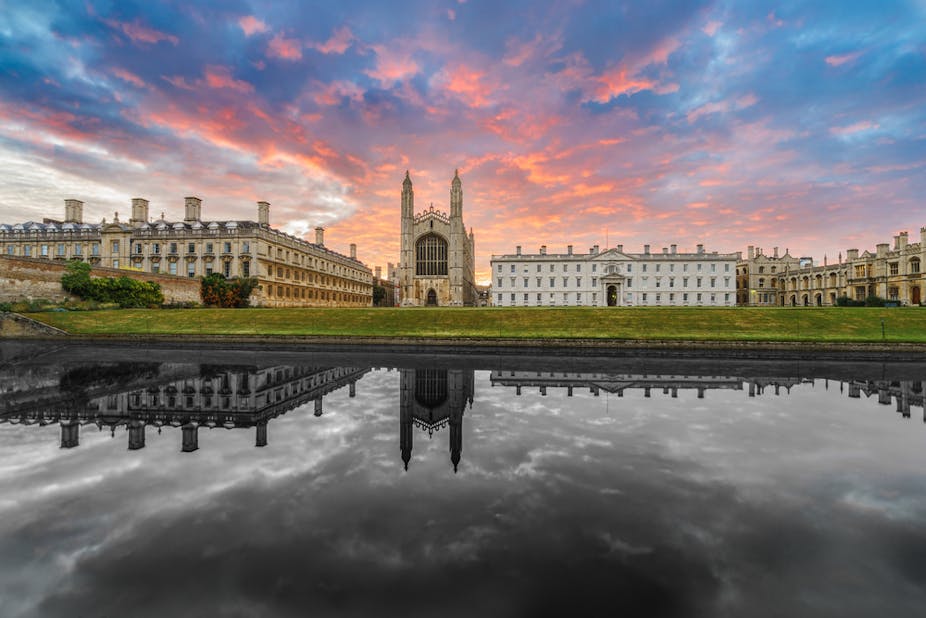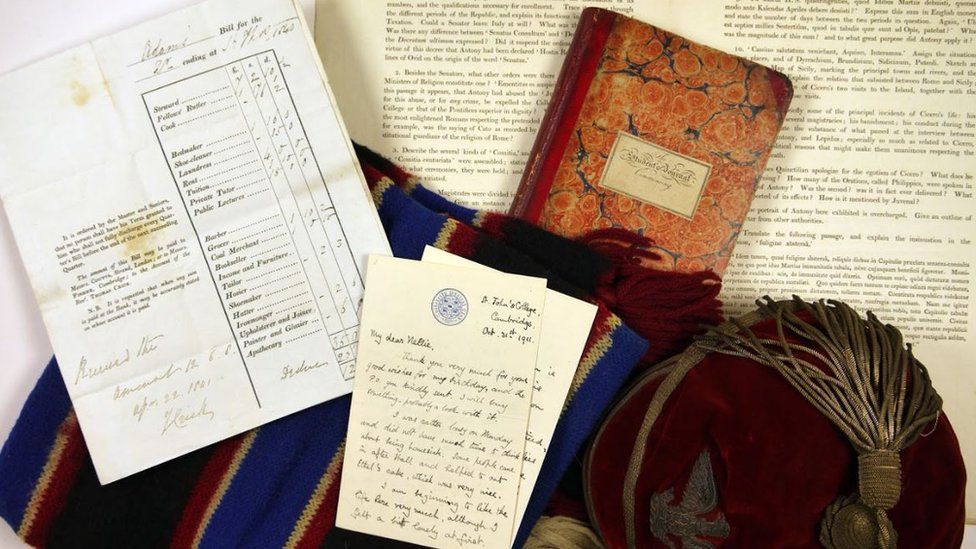Cambridge

Historically, Cambridge University in Cambridge, England, was generally considered the second-best university in the country, after Oxford, which its founders split from ca. 1209. (Enyclopedia)
However, around the 1700's, "Academically, Cambridge’s eminence was enhanced...by the pupils of Isaac Newton, and for more than a century thereafter mathematics was the prime field of study and the only subject in which examinations for degrees were conducted. In the nineteenth century degrees became available in law (1816) and classics (1824), and later in the century other honors courses were introduced" (Encyclopedia). Now, perhaps some of the most well-known graduates of Cambridge include the poets, "to name but a few, Edmund Spenser, Christopher Marlowe, John Milton, Alfred Lord Tennyson, Samuel Coleridge, and William Wordsworth."
Though Daniel Deronda's origin story remains unknown till the last chapters, he is generally seen as a happy boy. He lives with his Uncle, Sir Hugo Mallinger. In Book II, Chapter 16, Deronda inquires of his uncle what he would like Deronda to pursue at Cambridge:
One day near the end of the Long Vacation, when he had been making a tour in the Rhineland with his Eton tutor, and was come to a faewell stay at the Abbey before going to Cambridge, he said to Sir Hugo-- 'What do you intend me to be, sir?' They were in the lirrary, and it was the fresh morning. Sir Hugo had called him to read a letter from a Cambridge Don who was to be interested in him; and since the baronet wore an air at once businesslike and leisurely, the moment seemed propitious for entering on a grave suject which had never yet been thoroughly discussed.
'Whatever your inclinations lead you to, my boy...I don't expect you to choose just yet-by-and-by, when you have looked about you a little more and tried your mettle among older men. The university has a good wide opening into the forum..."
Sir Hugo also says, "That's all very fine, but in practical life nobody does give you the cue for pages of Greek. In fact it's nicety of conversaton which I would have you attend to - much quotation of any sort, even in English, is bad. It tends to choke ordinary remark. One couldn't carry on life comfortably without a little blindness to the fact that everything has been said better than we can put it ourselves." Sir Hugo is quite a character. He does go on to say that he wouldn't mind if Deronda becomes a barrister, like himself, but he does make it clear that it's only a wish on his part and not even a suggestion.
(Eliot 175 in my Penguin Classics version)
No wonder that Deronda is a happy child; no parent/guardian is ever that relaxed about what his ward's future is to be!
While at Cambridge, "though the impression he made...corresponded to his position at Eton," as "everyone interested in him agreed that he might have taken a high place if his motives had been of a more pushing sort, and if he had not, instead of regarding studies as instruments of success, hampered himself with the notion that that they were to feed motive and opinion - a notion which set him criticising metods and arguing against his freight and harness when he should have been using all his might to pull....In the beginning his work at the university had a new zest for him: indifferent to the continuation of the Eton classical drill, he applied himself vigorously to mathematics, for which he had shown an early aptitude for...That delight and the favorable opinion of his tutor, determined him to try for a mathematical scholarship in the Easter of his second year: he wished to gratify Sir Hugo by some achievement...
But here came the old check which had been growing with his growth. He found the inward bent towards comprehension and thoroughness diverging more and more from the track marked out by the standards of examination: he felt a heightening discontent with the wearing futility and enfeebling strain for excessive retention and dexterity without any insight into the principles which form the vital connections of knowledge"
I.e., Deronda's having an existential crisis that's interfering with his ability to care for school. How relatable!
He plans on eschewing Cambridge for a more expansive education gleaned from studing abroad, anyway, so it isn't such a shame when he loses out on the mathematics scolarship because he helps his friend Hans Meyrick achieve his classics scolarship after Hans stupidly buys an engraving that's too expensive and messes up his eyesight ("his eyes exposed to a bitter winde") by having to take a cheaper, 3rd class shoddy carriage on his return trip to Cambridge. Deronda..."made every other occupation secondary to that of being companion and eyes to Hans." Hans does win the scolarship and informs Sir Hugo of Deronda's help. Hugo is not angry when Deronda visits him to admit he plans on quitting school.

Later, after Deronda saves Mirah, it is his kindness toward Hans Meyrick durign their time at Cambridge together that allows Meyrick's mother to let her stay with her and her daughters, an important aspect of how the relationship between Mirah and Daniel develops.
works cited:
Eliot, George. Daniel Deronda. 1876, Penguin, 2003.
“Cambridge University.” Encyclopedia, 24 Aug. 2014, www.encyclopedia.com/social-sciences-and-law/education/colleges-internat...
images
"Cambridge launched a campaign against harassment and sexual misconduct in 2017."The Conversation, www.images.theconversation.com/files/204585/original/file-20180202-16208...
"Letters, exam papers, and accounts are on display. BBC, www.bbc.com/news/uk-england-cambridgeshire-37309362
Coordinates
Longitude: 0.114908500000
